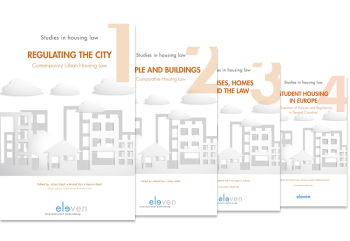Bekijk ons hele aanbod
Onderwijs
Gezondheidszorg
Juridisch
Management
Geschiedenis & Filosofie

Housing law is one of the most important and vital areas of law within the developed world. This is so because over recent decades it has moved from the narrow worlds of the legal academy and practice – usually categorized as a small part of property law or landlord and tenant law – and into the social and political mainstream. The growth of populations (particularly in large urban areas), rising immigration, a wider understanding of environmentalism not only in the strictly scientific sense but also in the social sense have created a serious need for better approaches in the funding, design, construction and management of housing. These issues present legal and regulatory problems that challenge lawyers and their traditional mechanisms of dealing with them.
This series aims to capture many issues with regard to housing law from many jurisdictions, and also to present approaches and solutions to these problems. Sometimes these solutions are familiar to lawyers, for example, obtaining or resisting eviction procedures through the courts or seeking an injunction against nuisance by a neighbour. However, this presents a narrow view of what law and lawyers do in contemporary housing matters. There is a wealth of informal mechanisms that seek to deal with housing problems in communities, between neighbours or between landlords and tenants, for example. Mediation and participation schemes, locally based action groups, early intervention programmes led by local authorities, delegated powers from various state or regional bodies exercised in various ways are just some of the instruments that now form part of this rich legal landscape.